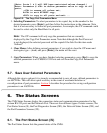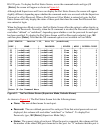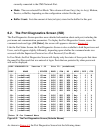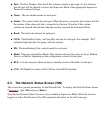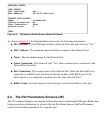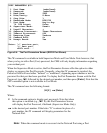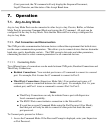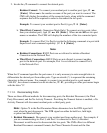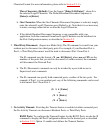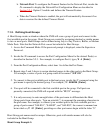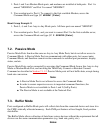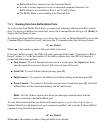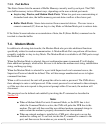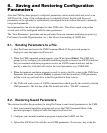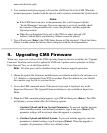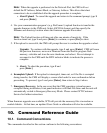
Character Format (for more information, please refer to Section 5.5.3.):
Three Characters (Default): Uses the format "[Enter]LLL[Enter]", where L is
the selected Logoff Character. The Default Resident Disconnect Sequence is
[Enter]+++[Enter].
.
One Character: When the One Character Disconnect Sequence is selected, simply
enter the selected Logoff Character once (Default = +). Note that it is not necessary
to enter a carriage return before or after the Logoff Character.
b.
If the default Resident Disconnect Sequence is not compatible with your
application, both the command format and Logoff Character can be redefined via
the Port Configuration menus, as described in Section 5.5.
c.
Third Party Disconnect: (Supervisor Mode Only) The /D command is issued from your
resident port to disconnect two third party ports. For example, if your Resident Port is
Port 1, a Third Party Disconnect would be used to disconnect Port 3 from Port 4.
The /D command uses the format: /D xx XX [Enter], where xx and XX are the
numbers of the ports that you wish to disconnect, if an N is entered, the command
will disconnect the Network Port.
.
The /D (Disconnect) command can only be invoked by a port with access to
Supervisor Level commands.
b.
The /D command can specify both connected ports, or either of the two ports. For
example, if Port 1 is your resident port, any of the following commands can be used
to disconnect Port 3 from Port 4:
/D 3 4 [Enter]
or
/D 3 [Enter]
or
/D 4 [Enter]
c.
2.
No Activity Timeout: Providing the Timeout feature is enabled at either connected port,
the No Activity Timeout can disconnect Resident Ports, or Third Party Ports.
RS232 Ports: To configure the Timeout Feature for the RS232 Ports, invoke the /P
command to display the Port Configuration Menu for the desired port as described
in Section 5.5.3. Option 11 enables and defines the Timeout Feature.
.
3.



